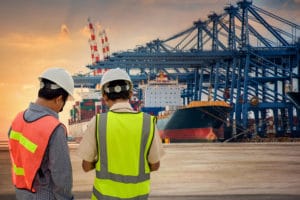
Working in the maritime industry can be incredibly rewarding. Many people find this industry to be lucrative and full of adventure. Unfortunately, it is an industry that is not without risk. Maritime injuries happen more frequently than injuries in most other industries. In today’s post, we take a look at some of the most common causes of maritime injuries. If you have questions about an injury you are suffering, do not hesitate to reach out to Maritime Injury Guide for support.
What are the Most Common Causes of Maritime Injuries?
Slip, Trip and Fall Accidents
Slip, trip and fall accidents are one of the leading causes of maritime injuries. The Occupational Safety and Health Administration (OSHA) estimates that at least 43 percent of maritime injuries are due to slips, trips or falls. These accidents happen for a variety of reasons, including:
- Wet or slippery surfaces
- Unmarked obstructions
- Improperly secured equipment
- Loose lines or cargo
- Missing guard rails or safety nets
- Inadequate lighting
- Loose ladders
- Lack of non-skid surfacing
- Inadequate housekeeping
Most slip, trip and fall accidents are preventable. It is important that anyone working in the maritime industry receive proper training on fall protection and prevention. Training should include how to keep the work environment safe and free from hazards. It is also important that workers know how to recognize hazards and prevent accidents.
Exposure to Toxic Chemicals
Maritime workers often work in environments that contain chemicals. Some of these chemicals are toxic and have a devastating impact on worker health. Some of the chemicals that most commonly cause maritime injuries include:
- Solvents: Every day, millions of workers suffer exposure to solvents. While many of these chemicals are commonplace in work environments, they can have devastating health consequences. Chemicals commonly found in solvents include alcohol, petroleum, turpentine, toluene, gasoline and kerosene. Exposure to these solvents can cause damage to the nervous system, kidney damage, infertility and cancer.
- Hydrogen Sulfide: Hydrogen sulfide is a gas that occurs when organic matter decomposes. Fishing ships are especially at risk for hydrogen sulfide buildup, especially if they are not properly ventilated. Workers on fishing ships may inhale the gas when they are in poorly ventilated areas.
- Benzene: Benzene is a chemical commonly used in cargo ships. It is used for maintenance and cleaning. Exposure to benzene can lead to immune system damage, leukemia and cancer.
- Heavy Metals: Lead and arsenic are two heavy metals that workers may come into contact with. Being exposed to high levels of either can pose a health hazard.
Exposure to Respiratory Hazards
Exposure to chemicals can cause respiratory distress, but there are certain hazards on many ships that specifically cause respiratory illness and disease. The two primary hazards are asbestos and crystalline silica.
- Asbestos: Asbestos is a naturally-occurring mineral that is resistant to heat, corrosion and mold. It is commonly used to make insulation, floor tiles and building materials. Workers who breathe in asbestos fibers are at risk for mesothelioma or lung cancer. Inhaled fibers attach to the lungs and cause scar tissue to build up. Consequently, fluid builds up and lung function deteriorates.
- Crystalline Silica: Crystalline silica is a mineral that is found in most rocks, sand and dust. It is commonly used as an abrasive to clean and strip ships. When crystalline silica is ground, cut or crushed it becomes respirable. Inhaling tiny particles of silica dust can lead to inflammation of the lungs. With prolonged exposure, workers are vulnerable to a dangerous and incurable disease known as silicosis.
Confined Spaces
Maritime workers are often required to work in “confined spaces.” A confined space is one that is not necessarily designed for people. Usually, these spaces are large enough for a workers to enter, but there is little room for movement. In most instances, confined spaces also have little ventilation. Occupancy is not an expectation in these areas, therefore, there is little to protect workers.
Some examples of confined spaces include:
- Tanks
- Storage bins
- Vaults
- Equipment housings
- Pipelines
- Duct work
- Engine rooms
Working in these spaces is dangerous because there is less oxygen and may be a higher concentration of chemicals or toxins. Maritime injuries in confined spaces often include respiratory injuries, poisoning and asphyxia.
Repetitive Movement
Workers in the maritime industry often repeat the same tasks. Repetitive movement can cause maritime injuries as they place stress on certain parts of the body. Consequently, the stress builds up and can lead to strains, sprains and joint damage. Some of the most common repetitive movement injuries that maritime workers suffer are:
- Tendinitis
- Bursitis
- Carpal Tunnel Syndrome
- Neck pain
- Nerve damage
- Soft tissue damage
- Chronic inflammation
- Joint damage
Repetitive movement injuries most often affect the back, neck, shoulders, wrists, knees and ankles. Of course, these injuries can affect most any part of the body where there is persistent stress.
Maritime Injuries and Your Legal Rights
If you work in the maritime industry, it is important that you know about your legal rights. With maritime injuries a very real threat, you should know how to act when an injury occurs. Maritime workers often qualify for benefits and compensation through maritime laws. It can be tricky determining which laws apply to you, however.
Do you qualify for maintenance and cure benefits? Does The Jones Act apply to you? Can you get compensation if a loved one dies in a maritime accident?
These are certainly relevant questions, and they deserve real answers. Learn more about maritime injuries and your legal rights by contacting Maritime Injury Guide. Our maritime lawyer can help you understand your legal rights and options. We can also review the circumstances of your maritime injury and help you pursue the benefits and compensation that you deserve.
To request a free injury consultation, call us at 1-866-871-8422. You may also email us via our online contact form.
Sources: